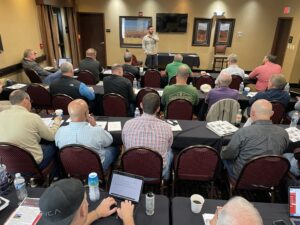
WASHINGTON (BP)–Reports of success using adult stem cells continue to mount, while reality is setting in for advocates of destructive embryonic research -– at least in California.
Experiments utilizing non-embryonic stem cells have provided hope for successful treatments of muscular dystrophy, lung ailments and back pain, according to recent reports.
Meanwhile, promoters of embryonic stem cell research (ESCR), which requires the destruction of tiny human beings, are acknowledging an expensive California initiative will not produce cures soon and may never do so.
According to The Los Angeles Times, a draft of California’s 10-year plan, which is scheduled to be approved the week of Dec. 4-8, says, “It is unlikely that [the California Institute of Regenerative Medicine] will be able to fully develop stem cell therapy for routine clinical use during the 10 years of the plan.”
An ESCR supporter went even further in his assessment.
“If there are therapies, they’re decades out,” said Jesse Reynolds of the Center for Genetics and Society in Oakland, The Times reported Dec. 3. “The Prop 71 campaign went beyond the line of responsible political rhetoric.”
In fact, The Times reported, “Gone are the allusions to healing such afflictions as spinal cord injuries and Parkinson’s and Alzheimer’s diseases that dominated the 2004 campaign for Proposition 71,” which will provide $3 billion in funding from bonds over 10 years for research utilizing embryonic stem cells and therapeutic cloning.
Baptist Press reported Oct. 5 the draft report said no cures may be developed after a decade.
Instead, the draft report establishes a goal of making progress toward a treatment using embryonic stem cells that can “restore function for at least one disease,” according to The Times. It also is hoped therapies for two to four more ailments will be “in development” within the 10-year span.
Meanwhile, recent reports of hopeful research using non-embryonic stem cells have included:
— The injection of stem cells from blood vessels has aided dogs with a type of muscular dystrophy, according to a Nov. 15 report by BioEd Online on research performed at San Raffaele Scientific Institute in Milan, Italy.
— A stem cell from human umbilical cord blood has differentiated into a type II alveolar lung cell, providing hope for the treatment of diseases such as emphysema and cystic fibrosis, according to an article in the journal Cytotherapy, and resulting in an agreement between the biomedical firm BioE Inc. and the University of Minnesota to do further research.
— Stem cells from a patient’s own bone marrow may be able to regenerate spinal discs and relieve lower back pain, according to researchers at the University of Manchester in Great Britain and reported by BBC News Nov. 30.
Stem cells are the body’s master cells that can develop into tissues and other cells, providing hope for the treatment of numerous afflictions. They are found not only in embryos but in such sources as umbilical cord blood, placentas, fat and adult bone marrow.
In addition to requiring the destruction of embryos, ESCR has not only failed to reach clinical trials in human beings but has been plagued by the development of tumors in lab animals.
Experiments using non-embryonic stem cells do not harm donors and have provided treatments for at least 72 ailments, according to Do No Harm, a coalition promoting ethics in research. Those include spinal cord injuries, lupus, rheumatoid arthritis, sickle cell anemia and multiple sclerosis.
While federal government funding of experiments on embryonic stem cells is barred, such research itself is legal and ongoing in this country.
NEW VERSE, SAME SINGER -– Peter Singer continues to come down on the side of chimpanzees over human beings.
The controversial Princeton University bioethics professor told the online magazine SX News in May that HIV research should be performed on brain-damaged people instead of chimps, it was reported Nov. 21 at the Internet news site bioethics.com.
“HIV research using chimps has not been very helpful as they don’t seem to get the disease in the same way humans do,” Singer said. “So I don’t think it’s right and it’s causing a lot of suffering and distress to beings who are sensitive animals –- social animals who should be living in social groups and who suffer being in isolation and confined and that’s wrong. If we need beings very like us to do this on, we should perhaps [turn to] the families of people who tragically have been brain-damaged and have no hope of recovery from persistent vegetative state who are totally beyond suffering because they are beyond consciousness. Often the families say, ‘We don’t want them kept alive,’ so what you could say is: ‘We agree they shouldn’t be kept alive indefinitely but since you’ve made the decision that it’s better that they have fluids and food withdrawn so they die, maybe we could keep them alive for another month or two to do some research that could save millions of lives potentially, and then allow them to die.’
“The more intellectually sophisticated non-human animals have a mental and emotional life that in every significant respect equals or surpasses that of some of the most profoundly intellectually disabled human beings.”
Wesley Smith, a lawyer and bioethics commentator, wrote on bioethics.com in response to Singer’s comments, “Well, I guess we should just dump the Nuremberg Code in the shredder and tear up the rules regarding ethical human subjects of medical research. Singer rejects human exceptionalism and embraces personhood theory, and so the cognitively devastated are reduced to so many guinea pigs. And while we’re at it, why not include unwanted infants in medical experimentation since … they too are not considered persons in Singer’s view. This is precisely where rejecting the belief in human exceptionalism and universal human equal moral worth leads us.”
Singer has long been an advocate for animal rights, rejecting the sanctity of human life and contending it is appropriate for animals to have human-like rights. He has said a dog or pig can have more capacity for “morally significant” qualities than a severely disabled human infant.
Singer surprised others in the animal-rights movement by endorsing experiments on the brains of monkeys that had helped in research on Parkinson’s disease, according to a Nov. 26 article in The Times of London.
EMILY’S LOSSES -– An abortion-rights political action committee suffered through another weak election cycle this year.
EMILY’s List, which funds female candidates who are Democrats and support abortion rights, won only two of the 19 Republican seats in the House of Representatives it targeted in the November election, Chicago Sun-Times columnist Robert Novak reported Nov. 29. This followed a 3-for-13 showing in races in which it confronted candidates funded by the conservative Club for Growth in the 2004 election, Novak reported.
The dismal record by EMILY’s List in this year’s races “provides yet another interesting confirmation that this election was a non-ideological confrontation between the two parties, decided mostly on the basis of a failed Iraq occupation and a corrupt Republican establishment,” Novak wrote.
In this year’s 19 races, EMILY’s List provided $1.5 million in independent spending and more than $900,000 in direct gifts, Novak said in a Dec. 3 column.
GREEN LIGHT FOR KLINE –- The Kansas Supreme Court rejected Nov. 30 the efforts of two abortion clinics to have the records of 90 patients confiscated, enabling Attorney General Phill Kline to continue his investigation.
The state high court ruled without comment against the Wichita clinic of George Tiller, the country’s best known late-term abortion doctor, and a Planned Parenthood clinic in Overland Park, according to the Associated Press. The clinics had urged the court to appoint a special prosecutor and remove the patient records from Kline’s possession.
The ruling will provide Kline until Jan. 8, when he leaves office, to file charges or send potential criminal cases to county prosecutors, AP reported. Kline lost his bid for re-election in November, falling to Democrat Paul Morrison.
After seeking records from the abortion centers for two years, Kline won a court battle and received them on 90 patients in late October. Kline said at the time the records were being examined for evidence of possible charges of rape, child rape, incest, illegal late-term abortions and doctors’ refusal to report child sex abuse, according to AP.
–30–
With reporting by Michael Foust.















